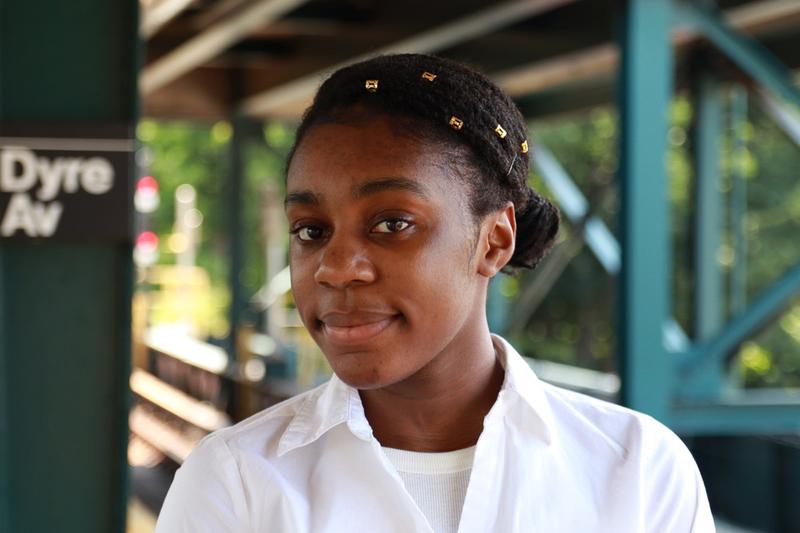Deborah Ugo-Omenukwa: Growing up, I wanted to be a lawyer. I was always interested in the criminal justice system and I watched a lot of Judge Judy and Law & Order. On TV, justice was always served. So I was excited when I found an internship that would teach me all about working in a courtroom.
Sound from a promotional video: All rise for the honorable judge
Deborah: It was EXACTLY what I wanted to be doing.
More sounds from the video: Case number 100..
Deborah: A mini court — made up entirely of teenagers — where we would work on real cases with young people facing charges for fighting, stealing or vandalism. It was with the Center for Court Innovation, which runs seven Youth Impact programs in New York and New Jersey. These programs take on low-level misdemeanor cases that would’ve been tried in court. If a defendant completes the program, their case is dismissed. I thought we would take on traditional courtroom roles and be given a case immediately. But instead we started talking about something called: Restorative justice. It’s a process that allows people to take accountability for their actions, confront the harm they’ve caused — and try to repair it. This happens through conversations that are called circles
Alexis Takahashi: This is our room where we hold the circles.
Deborah: Alexis Takahashi works at the Brownsville Community Justice Center, which has moved away from the courtroom-style model entirely. And more and more youth courts have made the switch to restorative justice.
Alexis: So when we do an in-person circle, you know, we’ll create an altar in the middle which is part of, like, creating the ceremony of setting up the space.
Deborah: Initially, I had a lot of questions about restorative justice: What if someone did something really dangerous? Just having a conversation could be a slap on the wrist. But I started to learn that the criminal justice system we have is punitive. Did you break the law? If so you get punished. But restorative justice asks different questions.
Alexis: So not like what rule was broken, but who was harmed? What was going on with that person that caused that harm? We recognize that causing that person to suffer isn’t necessarily going to address the root cause of why they caused that harm in the first place.
Deborah: The young people who participate don’t get punished. But they still have to face consequences.
Alexis: That might look like writing an apology letter or, you know, let’s say someone graffitied a wall, maybe they need to clean the graffiti or do community service or give back in some way.
Deborah: The more I learned about restorative justice, the more I started to see flaws in the larger criminal justice system. The one I had so badly wanted to serve in as a lawyer. But I still had questions: How can we ensure young people are actually open to the restorative process? And aren’t just looking for an easy way to get out of trouble?
Quinnshawn Dathan: It’s gonna change you as a person. You probably not going to want to change, at first.
Deborah: This is Quinnshawn Dathan. He’s 19.
Quinnshawn: When you first come in, you're going to be like, nah, this is nonsense — at first. And then you’re going to start listening.
Deborah: Quinnshawn ended up in court last year, where a prosecutor offered him the option to complete the restorative justice process.
Quinnshawn: The court system I’m not gonna say they bad, but they’re not really interested in what people have to say. They don’t see that, like, everybody is a person at the end of the day.
Deborah: He says he felt like the people at the community justice center actually believe in him. So he started to believe in himself. Now he wants to stay involved, like Cai Lewis, who was referred there five years ago.
Sound from a healing circle: Speak from your heart and your own experience…
Deborah: Cai had been getting into a lot of fights at school. But like a lot of the kids who get referred — there was more to her story. Cai didn’t have a stable place to live and her grandmother had recently died. She says opening up helped her identify and manage her emotions.
Cai Lewis: Coming to a space where people were actually genuinely interested into what I had to say, it just made me feel like a whole different person.
Deborah: Now she runs circles for other young people. She’s in college now and wants to open a nonprofit focused on youth.
Cai: From that point forward, I just wanted to continue to help people like be heard and, um, understand that your experiences are validated.
Deborah: I also want to help people but I don’t want to do it as a lawyer anymore. Even if I were to become the best lawyer ever, I would still have to work in a system that is more punitive than restorative. Leading these circles has taught me that we can change people’s lives by having conversations, digging deeper and trying to help people find solutions —- within themselves.
For WNYC, I’m Radio Rookies reporter Deborah Ugo-Omenukwa.

